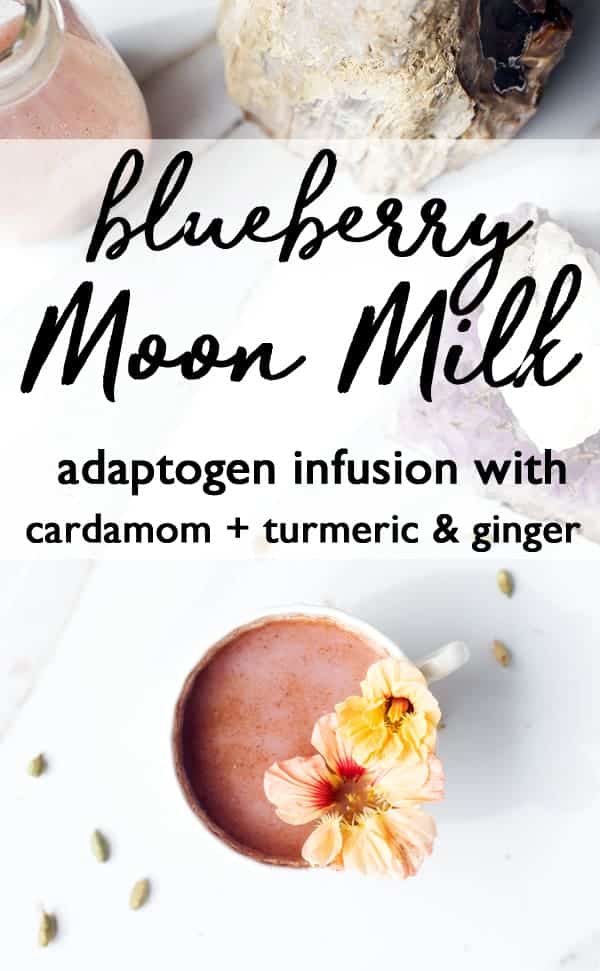Blueberry Moon Milk relaxes and rejuvenates with nourishing adaptogens, and spices like cardamom, turmeric and ginger mixed with blueberries.
What is moon milk?
Based on turmeric milk or golden milk recipes this blueberry moon milk is delicious!
Moon milks are warm concoctions that all basically have the same function – to deliver the nutrients of various herbs, roots, spices and mushrooms to your system while and (hopefully!) providing a moment of relaxation. Reminiscent of drinking a cup of chamomile tea aor warm milk. Moon milk provides a moment of stillness to the calm the mind and induce sleep.
It’s not always possible but the goal is to have some undistracted time to intentionally focus on what’s important and connect with those around you. To read more about this ‘golden hour’, golden milk, and ayurvedic medicine visit the Gaia blog for a nice concise summary.

Ingredients
There are many different versions of moon milk. And they all have a few things in common. Using milk fat to extract nutrients from plants and deliver them to your system.
Traditionally made with full fat cow’s milk many have been switching it out for milk alternative like coconut milk and almond milk. If using a lower fat milk alternative just make sure you don’t skip over the extra fat from coconut oil. The fat helps our body absorb the nutrients in the plant based herbs and spices, like turmeric.
In addition to turmeric there’s usually black pepper, ginger, cardamom, cinnamon, nutmeg and various adaptogenic herbs. All having their own powerful reason for being included. For example black pepper works to increase the effectiveness of the nutrients. Increasing their ability to be entered into the bloodstream and circulated through the body.

This version ups the flavor ante a bit with the addition of frozen blueberries. The blueberries go well with the gingery cinnamon flavor. But feel free to use whichever fresh or frozen berries you desire. A low simmer with milk to extract their flavor and color gives just that little something extra. Just make sure you don’t bring it to a full boil or you will curdle the milk.
Yield
This moon milk recipe makes a double batch – enough for one large cup or to share.
📖 Recipe

Ingredients
- 2 cups whole milk
- ¼ cup blueberries frozen or fresh
- 2 teaspoons coconut oil or ghee
- 1 teaspoon ginger root
- ½ teaspoon dried turmeric
- ½ teaspoon ground cinnamon
- 2 teaspoons mucuna powder
- 1 pinch cardamom or a handful of whole pods
- 1 pinch black pepper
- 1 pinch sea salt
Instructions
- In a small saucepan over medium low heat melt coconut oil. Add turmeric, cinnamon, black pepper and both ginger and cardamom if using the dried ground versions. heat until spices have become fragrant.
- If using whole cardamom pods and fresh ginger root, add now along with blueberries, otherwise just add blueberries. Warm berries through then add milk.
- Over medium low heat stir mixture and bring to a gentle simmer. Simmer up to 10 minutes being careful not to boil.
- Remove from heat and whisk in sea salt and mucuna or any other adaptogen you choose.
- Strain into drinking glasses to remove any ginger and blueberry chunks and enjoy warm.
Notes
Nutrition










Julie Running in a Skirt
What a tasty combination of flavors! I haven’t tried adaptogens yet and this looks like a great place to start.
Jacqueline
This sounds amazing and I’m thinking it would be so good for my hubby who is being treated for prostate cancer right now. I’ve never hear of mucuna but need to see if I can source it!
ONE armed MAMA
I hope mucuna or any other adaptogens can help your hubs through his treatments! The mucuna I use is from Hyperion Herbs and it’s very high quality, I definitely recommend that brand.
Patty
Very interesting post, I’ve never heard of adaptogens and will definitely check them and try your moonmilk!
Beth
Well, I just got an education on adaptogens! As a horticulturist in my former life, I know a lot of the plant names! This sounds like a delicious helper for sleep! I must try it because I am an awful insomniac! Thanks!
Elaine
I never knew what adaptogens were. How fun! I love how delicious and nutritious your blueberry moon milk looks and I can’t wait to try it!
ONE armed MAMA
I’ve been so interested in ayurvedic medicine and adaptogens for awhile but have been hearing more and more about them lately.. apparently they were one of the hottest food trends of 2019 so get ready to hear even more about them 🙂